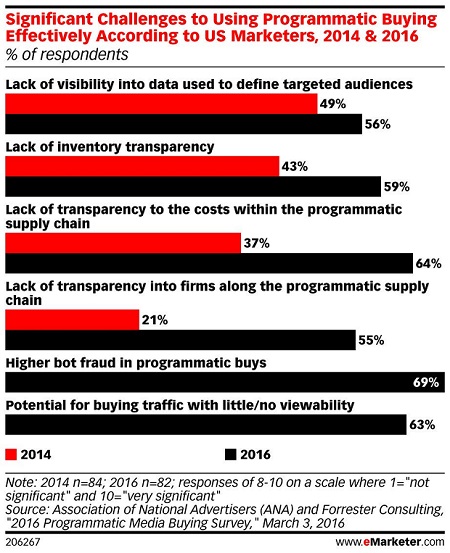As marketers hand more and more control over to automated trading platforms, are they in danger of appearing on ‘fake news’ sites that could damage their reputation? New research suggests marketers are increasingly worried about brand safety in programmatic buying.
A new survey conducted by eMarketer suggest s that many brands have ethical concerns about the content they are placed against, and programmatic trading platforms might not be able to distinguish between fake news sites and trusted publications.
The findings reveal a sharp rise in marketers concerns about “bot fraud in programmatric buys” and “potential for buying traffic with little/no viewability”.

Depending on the type of programmatic transaction method used, it can be difficult for advertisers to know with certainty where their ads may appear.
As programmatic marketing means means mass traditional approaches to manage toxicity such as profanity filters and block lists of negative keywords will not be sufficient to stop this occurring.
eMarketer expects US programmatic display ad spending to reach $25.23bn in 2016, accounting for 73.0% of all display ad spending.
By 2018, this will rise to $37.88bn, or 82.0% of total spending on display.
To help address the issue of transparency, most demand-side platforms (DSPs) offer tools such as whitelists, blacklists and semantic technologies to help advertisers filter out sites and placements they may find problematic.
Whitelists allow advertisers to be more aggressive in their safeguards by indicating only those sites where they want their ads to appear, while blacklists allow advertisers to specifically indicate the sites on which they do not wish their ads to appear. Semantic technologies offer advertisers the ability to filter language and context to bar their ads from appearing on certain sites or next to certain types of content.
Source: https://www.emarketer.com/Article/Rise-of-Fake-News-Gives-Brands-Shiver/1014803?ecid=NL1001

